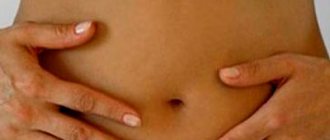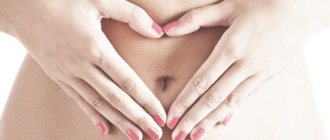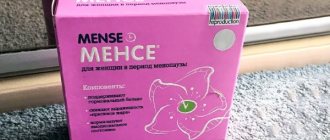Type of itching
During menopause, the secretion of sex hormones, especially estrogen, decreases. Because of its properties, it is often called the beauty hormone. It provides the skin and mucous membranes with elasticity and necessary hydration, and prevents the formation of wrinkles. Estrogen deficiency affects the condition of all types of epithelium, leading to various symptoms, including itching. In most cases, it is accompanied by a burning sensation, and sometimes pain may occur. The affected areas of the epithelium often become infected and injured. An unpleasant sensation can occur in any part of the body, affecting both the skin and mucous membranes.
Cutaneous
Declining fertility is accompanied by a decrease in collagen in the skin, causing it to become thinner, lose moisture and become excessively dry. Against the background of these changes, itching may occur on all areas of the skin, especially on the back, décolleté, and arms.
In the intimate area
Most often, itching in women during menopause occurs in the intimate area, spreading from the perineum to the labia majora and minora. The walls of the vagina, thighs, and pubis are also affected. Occurs during premenopause and can last until menopause. It intensifies at night and after hygiene procedures.
How to treat itching during menopause?
If itching occurs during menopause, treatment should be selected by an experienced and qualified specialist. Self-medication in such a situation is simply not acceptable. In order for a specialist to prescribe the correct treatment, it is necessary to first undergo certain diagnostic methods. Based on these results, a subsequent scheme for eliminating this pathology is being developed.
There are topical preparations that are designed directly for itching in a woman’s intimate area. But if the true cause that provoked the formation of this pathology is not eliminated, then the effect of such remedies will not last long. Moreover, the disease itself will continue to progress.
The basis of therapeutic treatment for itching in the vaginal area during menopause should be to eliminate the true cause of its occurrence. If the culprit for the formation of itching is the development of atrophic vaginitis, that is, dry mucous surfaces, then vaginal cream, suppositories or gel containing estradiol can help.
Such preparations include components that can have a softening effect on the tissues of the mucous membrane, as well as components that perform an antiseptic role. The most effective among these means are:
- Estriol suppositories ;
- vaginal suppositories Ovestin ;
- preparations in the form of gels: Divigel , Klimara , Ovestin ;
- creamy texture preparation: Dermestril .
Moreover, preparations containing moisturizing oils and soothing components can be used, among which the following are especially effective: Cicatredin , Ginocomfort , Vagikal and Montavit .
In situations where itching occurs against the background of pathological processes accompanying the menopause, it is treated using symptomatic therapy:
- With the development of diabetes mellitus, to normalize glucose levels, medications such as Metformin or Siofor are prescribed. Therapy for itching is complemented by adherence to a special diet and the use of local spectrum drugs.
- For thrush, vaginal suppositories Clotrimazole, Pimafucin or Mikanazole are prescribed.
- Tingling during menopause, which occurs against the background of herpetic infection, is treated with Herpferon or Alpizarin ointments. And also creams - Zovirax or Famvir, which should be used at least 4 times a day. Also, therapeutic treatment using ointment, cream or gel should be accompanied by oral intake of vitamin complexes and immunomodulators.
- Treatment of trichomoniasis requires long-term use of Metronidazole along with vitamin complexes. The sensation of itching that occurs during the development of this pathology is eliminated by taking tableted drugs such as Ornidazole or Ginalgin. And also using Clindamycin cream and regular treatment of the vaginal area with a drug such as Protargol.
- For vulvovaginitis, in most cases, vaginal suppositories Betadine, Terzhinan, Yodoxir or Mikozhinax are prescribed.
- The ailment caused by itching due to dermatitis is treated with a special diet and antihistamine drugs - Radevit, Solcoseryl or Vedistim.
But if you do not maintain the optimal level of hygienic care for the intimate area, then the process of restoring the previous comfort in the vaginal area will become impossible. But even the procedure for hygienic care of the vaginal area can cause a huge feeling of unpleasant discomfort. Therefore, in order to relieve inflammation and have a beneficial effect on the inflamed areas of the genital organs, it is recommended to wash yourself in water with the addition of decoctions of the following medicinal plants:
- sage;
- series;
- field chamomile;
- yarrow;
- celandine.
The feeling of itching during menopause, with timely treatment, is very treatable and ceases to bother you. Therefore, it is recommended to suppress such manifestations in the initial stages of anxiety, without leading to serious complications.
Educational video on this topic:
About
https://youtu.be/4epLEzVtL68
Causes
The main cause of the pathology is menopause and the associated hormonal changes. With age, the epithelium changes, losing turgor due to collagen deficiency. Other symptoms of menopause, such as hot flashes, can aggravate the itching. Here are the most common causes of itching:
- decreased estrogen secretion;
- loss of collagen;
- dry skin and mucous membranes;
- irritation later due to increased sweating;
- allergic reactions;
- infections.
Reference. Sweat contains salts and alkalis, which irritate the skin, leading to inflammation, pain and burning. Sweating increases itching and promotes inflammation at the site of its localization.
Some scientists suggest a neurogenic etiology for the occurrence of the symptom, linking ovarian involution with inhibition of the hypothalamic-pituitary system.
Thinning of the epithelium
Estrogen and its parent substances not only stimulate ovulation. They activate desquamation and regeneration of the epithelium of the mucous membrane, making it thicker and stronger. Therefore, during menopause, tissue restoration is impaired. Estrogen deficiency leads to atrophy of the vaginal mucosa and its thinning. Dryness occurs due to insufficient secretion of cervical mucus and disruption of the functioning of the goblet glands.
Hormonal imbalance slows down metabolism and worsens the immune system. Often at this age, women develop allergies to substances that they previously tolerated well. So the cause of itching can be an allergy to household chemicals, body care products, food, or medications.
Pathologies
On the dry, thinned epithelium, many microtraumas occur, which are the entrance gates for infection. Some types of bacteria and fungi produce toxins that cause subcutaneous itching.
Methods of therapy
To treat itching that occurs during menopause, the following therapy methods can be used:
- Treatment with hormonal drugs;
- Use of phytoestrogens;
- Traditional medicine recipes.
The choice of treatment method and features is made by the doctor and is always based on test results. To eliminate itching during menopause, the main goal of therapy is to relieve the cause of the symptom.
Hormone therapy
Hormonal therapy is used to treat dryness and itching in the genital area during menopause when the main cause of the pathology is a hormonal imbalance in the female body. Also, in some cases, the use of hormone-containing products is justified in the event of the appearance of cancerous formations that provoke itching.
During treatment, hormonal drugs can be used in the following pharmacological forms:
- Pills;
- Vaginal suppositories and gels;
- Plasters;
- Intramuscular injections.
In most cases, the main active ingredient of the drugs is estrogen, the amount of which decreases significantly during menopause, which provokes vaginal dryness and itching.
Hormonal therapy can be carried out in three different ways:
- Cyclic or continuous monotherapy using estrogens and progestogens.
- Cyclic combination of continuous and intermittent use of drugs.
- Combined monophasic therapy.
Cyclic intake of hormonal drugs, mainly in the form of tablets, allows you to simulate the normal female menstrual cycle.
Hormonal therapy is one of the options for treating itching during menopause
Treatment with hormones not only improves a woman’s well-being, but also often serves to prevent the development of cancer in the uterus and mammary glands. However, taking hormonal drugs has many contraindications, due to which treatment can be carried out in other ways.
Treatment with phytoestrogens
Phytoestrogens are preparations of exclusively plant origin containing estrogen-like components. The properties of these drugs continue to be studied. However, it has been precisely established that phytoestrogens have a positive effect on the functioning of the cardiovascular system, smooth out the symptoms of menopause and help prevent the development of cancer.
Indications for the use of phytoestrogens are the following factors:
- Early onset of menopause, before the age of 50;
- The problem of high blood pressure;
- Diabetes;
- Individual characteristics of the menstrual cycle. Late onset of menstruation, as well as heavy and prolonged or scanty discharge;
- The presence of pathologies of the cardiovascular system, as well as a high risk of their development;
- Features of a woman’s lifestyle and nutrition. Frequent consumption of unhealthy foods and drinks, including coffee and strong tea.
Phytoestrogens, useful for women during menopause, contain flavones, isoflavones, lignans and coumestans. These substances are found in high concentrations in red clover, black cohosh, as well as legumes and soybean plants.
Traditional methods
To cure itching and burning during menopause, many women use traditional medicine recipes. During treatment the following procedures may be performed:
- Taking medicinal baths;
- Douching. The procedure is carried out strictly as prescribed by the doctor and no more than 3 times a week. Otherwise, the itching can only intensify, because in the process of douching the protective layer of the vaginal mucosa is washed away, and it is easy for pathogenic microorganisms to penetrate into it;
- Applying lotions;
- Use of decoctions and infusions of medicinal herbs internally.
Regardless of the method of carrying out the procedures, dried flowers of medicinal plants are boiled or infused in boiling water.
To treat itching in a traditional way, the following medicinal herbs and plants are used:
- Chamomile;
- Sage;
- Calendula;
- Uterus hog;
- Red clover;
- Wild peony root;
- Maryin root;
- Stinging nettle flowers.
Chamomile is often used to treat itching during menopause.
Despite the relative safety of traditional methods of treatment, it is worth remembering that each plant has its own contraindications and can lead to side effects. Therefore, before using them, it is important for a woman to consult a doctor.
Symptoms
Itching associated with thinning of the dermis differs from pathological itching, which is caused by various diseases. Identifying accompanying symptoms and the characteristic manifestation of itching will help distinguish it from other diseases. Symptoms of itching during menopause are:
- complicated by burning;
- worsens before bedtime and at night;
- accompanied by dry skin or mucous membranes;
- not accompanied by hyperemia and edema;
- often occurs after heavy sweating.
Itching in the vagina intensifies during sexual intercourse, accompanied by acute pain, burning, swelling and tissue hyperemia. During sex, the mucous membranes are often injured, which is why sexual intercourse is painful and minor bleeding appears after it.
It is worth noting the individual course of the pathology. Doctors note that the intensity, severity and localization of discomfort can be completely different in different patients. The intensity of the sensations can be almost unnoticeable, moderate or almost unbearable. It is often localized in the intimate area, on the back, décolleté, arms, face.
Itching and burning often lead to involuntary scratching of the epithelium, especially at night. Sometimes women injure the skin so badly that after healing, scars remain. If the resulting wounds are not promptly treated and their condition is not monitored, they can become infected and inflamed.
Due to metabolic disorders and loss of collagen in the dermis, the water-electrolyte balance is disrupted, with the development of excessive dryness and loss of elasticity. This causes the skin to feel tight.
Folk remedies
Non-traditional treatment methods help relieve itching in the intimate area that appears spontaneously. They help women out until the doctor selects medications for them to eliminate the cause of discomfort.
As a rule, traditional methods help eliminate itching that was caused by external irritants. If the cause of discomfort is illness, then they can only temporarily mask the unpleasant sensations. You will have to fight the disease only with medications, which must be prescribed by a doctor.
If the prescribed treatment does not bring the expected relief within a few days, it is worth replacing ineffective medications with more effective ones that are suitable for a particular woman. You should contact your gynecologist with this request.
Apple vinegar
It has antifungal and antibacterial properties. A solution is made based on this product. It consists of a glass of warm water and 2 tbsp. l. main ingredient. This solution should be used to wash the affected area twice a day for 2-3 days.
Compress with ice cubes
To eliminate signs of itching, which worsens at night, you should apply frozen water cubes wrapped in several layers of gauze to the labia.
Salt bath
Salt is a natural remedy that fights irritation and inflammation. The genitals should be carefully washed with a concentrated food-based solution. It also wouldn’t hurt to take a sitz bath, which will help eliminate irritation and itching in an intimate area.
Antibacterial talc
This product is gentle on the skin. However, it will not achieve a quick effect. It will be possible to notice a positive result only with prolonged treatment of the genitals with this composition.
Diagnostics
If itching occurs during menopause, as at any other age, you should visit a doctor. This will allow you to exclude other pathologies and diseases, or to identify them in a timely manner and undergo treatment. It is recommended to visit a therapist, gynecologist and allergist. In some cases, consultation with a dermatovenerologist is required. To carry out differential diagnosis, the following research methods are used:
- examination of the vagina and cervix in speculums;
- bacterial examination of a smear from the vagina and cervical canal;
- immunological blood test to identify allergies;
- blood glucose;
- general blood and urine analysis.
Using an ultrasound examination of the pelvic organs, dysfunction of the ovaries can be detected. You can also confirm the onset of menopause by determining the level of estrogen in the blood.
What to do if you experience discomfort
You need to see a gynecologist for an examination, which includes:
- gynecological examination using a speculum;
- bacterioscopy and culture of genital smears for flora;
- clinical and biochemical blood test;
- clinical urine analysis;
- if necessary, the patient is sent for consultation to a dermatologist, endocrinologist or other specialists.
Based on the results obtained during the examination, the doctor prescribes complex therapy for the identified disease.
To reduce itching, ultrasound therapy is prescribed, and the affected areas are lubricated with hydrocortisone ointment.
If the itching is painful, the area is injected with anesthetics or the nerve endings are surgically removed.
How to reduce itching?
- Wash with warm water twice a day. The use of soap is not recommended. For washing, you can prepare a solution of chamomile or furatsilin.
- You shouldn't have sex for a while.
- To moisturize the vagina, there are lubricants and gels with medicinal extracts.
- Follow a diet, exclude spicy, sweet, alcohol, allergens.
- For treatment, use only those medications prescribed by the doctor.
Treatment
Before treatment, you must visit a gynecologist. Only after conducting an examination and identifying the cause of the itching will he determine what to do to eliminate the unpleasant symptom.
The management of patients depends on the etiological factors of itching. If it arose due to concomitant pathology, it is important to undergo etiotropic treatment. So, if a bacterial infection or an increased amount of fungus is detected, antibacterial therapy is indicated. It is carried out after determining the pathogen and its sensitivity to various antibiotics.
If an unpleasant sensation occurs due to an exacerbation of diabetes mellitus, you should immediately contact an endocrinologist to prevent more serious complications.
If an allergy is detected, it is necessary to exclude the allergen and carry out antiallergic treatment.
What do you need to remember?
- During menopause, itching of the skin and itching of the genitals occurs.
- The cause of its occurrence is associated with a decrease in estrogen and deterioration of the epithelium.
- The main symptom is the appearance of itching in various parts of the body, accompanied by burning and irritation.
- Diagnosis is carried out to exclude diseases and pathological conditions not related to menopause.
- Treatment includes the use of antihistamines, herbal remedies and hormonal agents.
- To prevent the development of itching, you should lead a healthy lifestyle and visit a gynecologist in a timely manner.
Literature
- Smetnik, V.P. Estrogens. / V. P. Smetnik - M.: Practical Medicine, 2012. - 176 p.
- Balan V.E., Yesesidze Z.T., Velikaya S.A. Principles of hormone replacement therapy for urogenital disorders.//Consilium medicum.com. 2001. - T.Z. — No. 7. — p.332 – 336
- Arabian, E.R. Skin changes in perimenopause: principles of modern complex correction / E.R. Arabian // Clinical dermatology and venereology. - 2007. - No. 2. - P. 97 - 100.
- Akhtyamov, S.N. Clinical and morphological features of skin aging / S.N. Akhtyamov, AA Kyagova // Bulletin of Dermatology and Venereology. -2005. -No. 4. - P. 60-64.
- Dubinskaya, V.A. Human skin: moisture exchange and aging / V.A. Dubinskaya, E.V. Vinogradova // Clinical gerontology. - 2007. - T.6, No. 7 - P. 22-28.
- Ilyina, L.M. Changes in appearance with age (possibilities of hormone replacement therapy) / L.M. Ilyina // Gynecology. -2003. - T5, No. 3. — P. 108-112.
- Mirzoeva, P.N. Topical phytoestrogens in the correction of involutional skin changes / P.N. Mirzoeva, E.V. Matushevskaya, Ya.Z. Zaidieva // Medical cosmetology and aesthetic medicine. — 2009. -№3. — P. 87 — 92.
- Vikhlyaeva E.M. //Postmenopausal therapy. — M.: MEDpress-inform, 2008. pp. 42 – 45
- Kulakov V.I., Smetnik V.P.//Guide to menopause. -M. Medical Information Agency, 2001.- p.361-362
- Rebrova G.A., Berzhitskaya V.V., Vasilevsky V.K. and others. Some factors of collagen aging.//Biomedical Chemistry 2003; 49(2): 128137
- Best N., Rees M. et all. Effect of estradiol implant on noradrenerig function and mood in menopausal patients. // J. Psychoneurendocrynology, 1992.-№17.-P.87-93
Preventive measures
To prevent the occurrence of itching in intimate places during menopause, it is important to understand that the body is completely rebuilt to new working and living conditions. A woman should facilitate this process by changing her pace and way of life. So, to prevent the development of pathology, it is recommended to adhere to the following rules:
- Adjust your diet. It is necessary to significantly reduce or completely eliminate salty and smoked foods.
- No smoking.
- Stop drinking alcohol.
- To live an active lifestyle. However, if before the onset of menopause a woman was overly physically active, then during menopause the pace of exercise must be reduced.
- Refuse to wear synthetic underwear of any type. Acceptable fabrics are linen and cotton. In this case, the underwear must be appropriate to the woman’s size. You should also avoid thongs.
- During hygiene procedures, do not use very hot water, as it will significantly increase dry skin.
- Avoid using deodorized intimate soaps and gels. Try not to use scented bath additives. For washing, use moisturizing, preferably baby, soap.
- Do not douche without a prescription from a supervising gynecologist. This procedure, if used incorrectly and too often, leads to vaginal dryness and itching.
- Get medical examinations regularly. For women without any pathologies, it should be performed at least once a year. If the patient is registered with a gynecologist for pathologies of the genitourinary system, then the minimum frequency of examinations is 2 times a year.
Also, to prevent the occurrence of itching during menopause, it is important for a woman to follow the rules of personal and intimate hygiene, as well as constantly use contraceptives during sexual intercourse.










